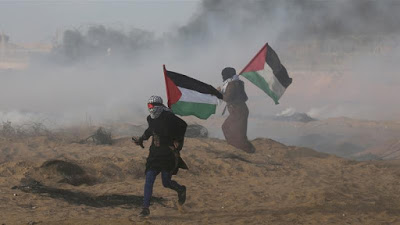How Israel is being absolved of Palestinian women’s rights abuse
 |
| Yara Hawari 08 Mar 2019 |
Since the Oslo Accords, systematic efforts have been made to depoliticise women’s rights activism in Palestine.
Although International Women’s Day has its roots in revolutionary and anti-capitalist grassroots women’s movements, in the Global South its celebration has come to be dominated by the UN and the NGO sector. The occasion is often used to reinforce certain development narratives of women’s rights and to fundraise for projects.
This year, in Palestine, UN agencies, various international organisations, and local NGOs launched a week-long campaign called, My Rights, Our Power, which is meant to “to raise awareness on women’s fundamental human rights” and domestic violence, in particular.
It focuses on five areas of concern: the right to a life free of violence, the right to achieve justice, the right to seek help, and the right to equal opportunities and the right to make one’s own choices.
However, organisers have made one glaring omission in the campaign message: It does not mention the Israeli occupation of the West Bank and Gaza as a major contributing factor to rights violations committed against Palestinian women. The words “occupation” or “Israel” are nowhere to be found in distributed press releases and campaign materials.
So, are we to believe then that Palestinian women are able to achieve justice and a life free of violence in the context of the continuing Israeli project of ethnic cleansing and cultural erasure?
This omission is clearly not a mistake or an oversight, rather it reflects a noticeable trend in the discourse of the international aid and donor community which talks about “issues” and “barriers” in the field of women’s rights as if they all happen in a political vacuum.
In Palestine, this trend accelerated after the Oslo Peace Accords which served as a catalyst for the de-politicisation of Palestine. Twenty-five years ago, Oslo introduced a new frameworks for “peace” and “state-building” which not only undermined the Palestinian liberation project but also set in motion a fundamental transformation of the Palestinian civil society.
Under this new framework, foreign aid was channelled into Palestine and used to systematically depoliticise its civil society by making it dependent on external funding and forced to follow the agenda of foreign donors.
While this process of NGO-isation has demobilised many groups within Palestinian society, women remain disproportionately affected. Patriarchal tendencies within Palestinian institutions have also assisted in the process of excluding women from the public sphere, including politics.
The de-politicisation of women is particularly noticeable in the use of a post-Oslo lexicon on women’s rights in Palestine. Many concepts pertaining to human rights and activism have been purposefully assigned a limited definition by UN agencies and other international organisations. One example is the term “empowerment”, which on the surface sounds revolutionary, but in the context of NGO-led projects and public discussions is almost always limited to the socioeconomic sphere.
That is, the NGO sector never talks about political empowerment of Palestinian women that could strengthen their ability to resist Israeli gendered and colonial violence.
Since its foundation in 1948, the Israeli regime has consistently and systematically used gendered oppression against Palestinian women, particularly those who are politically active.
Its tactics include harassment, threats of violence and imprisonment – the latter being the most effective way to punish politicisation.
Palestinian women who actively defy the Israeli occupation and refuse to be coopted by official Palestinian political order created by the Oslo accords, such as legislator Khalida Jarrar, who was detained for 20 months without trial and poet Dareen Tartour, who was sentenced to five months in prison over a poem she wrote, quickly become targets of the Israeli security services.
Interrogations by Israeli soldiers or security forces often include sexual harassment or threats of sexual violence to put pressure on women and girls to sign confessions or to give information.
Last year, a leaked video showed Palestinian teenager Ahed Tamimi, who was arrested for slapping an Israeli soldier, being subjected to harassment during an interrogation.
Unfortunately, the violations of Palestinian women’s rights have become an accepted fact of life and those that are supposed to ensure these rights are upheld have become complicit in their very violations.
While Palestinian women must be empowered to fight internal patriarchy, particularly within the private sphere, it cannot be ignored that gender violence is inherently tied to the Israeli regime which controls most aspects of Palestinian life.
Acknowledging the destructive role Israeli settler colonialism plays in Palestinian women’s lives also does not absolve the Palestinian society at large of its role in women’s oppression.
The failure to recognise that colonial and patriarchal power structures overlap and are together complicit in the victimisation Palestinian women and men has greatly limited progress on women’s rights in Palestine. In this context, we would do well to remind ourselves that radical feminism was established by women of colour who insisted on a complex and nuanced understanding of female oppression that factors in colonialism, structures of racial hierarchy, class and capitalism. It is only with this understanding in mind that we can hope to dismantle women’s oppression in Palestine and around the world.
The views expressed in this article are the author’s own and do not necessarily reflect Al Jazeera’s editorial stance.


